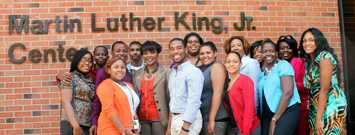Sharing CDC’s 24/7 Message through Ambassadors
 CDC Ambassadors – college students and staff share message of saving lives and protecting people from health threats through community outreach such as health fairs and faith based organizations.
CDC Ambassadors – college students and staff share message of saving lives and protecting people from health threats through community outreach such as health fairs and faith based organizations.
CDC works 24/7 to keep America safe from health, safety, and security threats, both foreign and domestic. This work extends beyond scientists, epidemiologists, and researchers, requiring an all-hands effort to ensure that the messages are delivered and the behind-the-scenes work is shared. The Community Relations Team and the Human Capital and Resources Management offices both have taken a nontraditional approach to spreading this message through CDC Ambassadors. Technically, everyone who works for the agency is a CDC Ambassador because they all work together to help save lives and protect people from health threats.
The Community Relations Team led by Susan Laird conceptualized the CDC Ambassador program in which team members train employees, contractors, and university fellows alike in community outreach that spreads the 24/7 message in schools, community- and faith-based organizations, and at events in their own neighborhoods. To date, over 150 staff members have been trained, and 1,900 community members have been educated. Important health information has been shared, particularly proper hand-washing methods—the number one way to prevent illness.
Most recently, the Community Relations Team met with Ruth Harris, a public health analyst with the Human Capital and Resources Management offices, to come up with ways to help students become more effective CDC Ambassadors. The Thurgood Marshall College Fund/Centers for Disease Control and Prevention Student Ambassador Program was designed to increase interest in CDC and in public health as a career choice at the 47 historically black colleges and universities that are members of the Thurgood Marshall College Fund (TMCF). During the summer, students are trained and paired with staff from various disciplines across multiple agency programs to learn aspects of public health ranging from accounting to public policy. After they finish the program and return to their schools, student ambassadors are charged with promoting public service and public health at their campuses and in their communities. Student ambassadors are in a unique position to speak to their peers about public service and public health as means of making a difference.
A brief training regimen was tailored for student ambassadors that taught them how to set up and participate in health fairs, engage their peers via social media, as well as how to write meaningful tweets and posts. The team also shared ways to locate resources appropriate for their target audiences. Students were eager to take what they had learned back to their campuses and begin their public health careers early, which entailed sharing CDC’s 24/7 mission—saving people and protecting them from health threats.
This sentiment was further conveyed by Perin Bostic, a TMCF/CDC summer intern who heard about the Thurgood Marshall College Fund Fellowship from one of his colleagues. “Knowing my interest in public health and service, he approached me about applying for this great opportunity,” Bostic said. His motivation for choosing CDC stemmed from his passion for public health and public service. “I knew choosing the CDC would have great impact by increasing my knowledge of public health, the CDC, and Health and Human Services.”
These two programs, although varied in structure and scope, both aim to support communities to live healthier lives by preventing health threats and being informed.
- Page last reviewed: August 6, 2012
- Page last updated: August 6, 2012
- Content source:
- Office of the Associate Director for Communication
- Page maintained by: Office of the Associate Director for Communication




 ShareCompartir
ShareCompartir